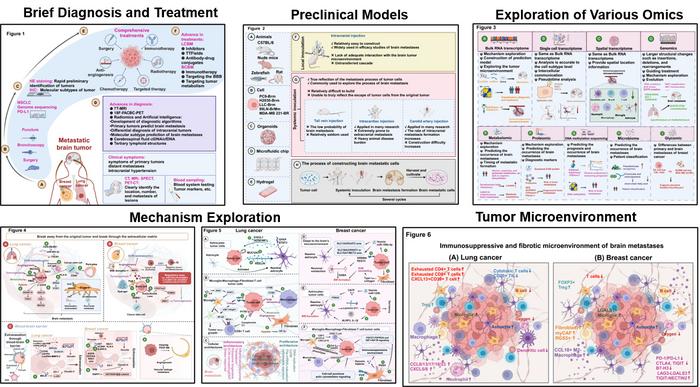Metastatic brain tumors represent a daunting challenge within the realm of oncology, given their complex nature and dire prognostic implications. As an intricate subset of neoplasms, they arise from cancer that originates in other parts of the body, such as the lungs or breasts, before spreading to the brain. This migration is not merely a physical journey; it reflects a sophisticated interplay between tumor cells and the unique environment of the central nervous system. Researchers, led by renowned oncologists Professor Rongrong Zhou and Professor Jie Yang from the Department of Oncology at Xiangya Hospital, Central South University, are paving the way for a deeper understanding of this phenomenon.
The evolution of knowledge surrounding metastatic brain tumors has been significantly enhanced by technological advancements. A pivotal aspect of this development is the advent of multi-omics technologies, which encompass various layers of biological information such as genomics, proteomics, and metabolomics. By analyzing these different facets, researchers are constructing a multifaceted picture of brain metastasis, allowing for improved diagnostic accuracy as well as more targeted therapeutic strategies. The implementation of artificial intelligence in conjunction with these technologies has further accelerated progress, offering unprecedented insights into tumor behavior and treatment responses.
Understanding the tumor microenvironment is also crucial in the fight against metastatic brain tumors. The brain presents a unique landscape due to the existence of the blood-brain barrier, which not only protects the central nervous system but also complicates the delivery of therapeutic agents. Tumor cells must navigate this barrier to successfully establish themselves within the brain. As such, dissecting the molecular and cellular interactions within this niche is essential for developing novel therapeutic modalities that can effectively target these aggressive tumors.
Current treatment approaches for metastatic brain tumors typically involve a combination of surgery, radiation, and systemic therapies. However, these methods often falter in delivering long-lasting results, leaving patients with limited survival prospects. The urgency for innovative treatments is underscored by the poor prognosis associated with these tumors, where life expectancy post-diagnosis often does not exceed several months. This grim reality prompts ongoing research aimed at unraveling new vulnerabilities specific to metastatic brain tumors.
The significant role of artificial intelligence in oncology cannot be overstated. AI algorithms are becoming increasingly adept at analyzing vast datasets, identifying patterns, and predicting outcomes based on historical patient data. This capability is particularly valuable in the realm of oncology, where treatment plans often rely on a multitude of variables. Machine learning models can potentially guide clinicians in personalizing treatment regimens for patients with metastatic brain tumors, optimizing the delicate balance between efficacy and toxicity.
Moreover, advancements in imaging technologies are transforming how clinicians visualize and assess tumors. Imaging omics, a relatively new subfield, employs advanced imaging techniques combined with computational analytics to extract valuable data from medical images. This integrative approach promotes a more comprehensive understanding of tumor characteristics, aiding in the timely diagnosis and monitoring of metastatic brain lesions.
Professor Zhou and his team emphasize the importance of collaborative research across different disciplines to leverage the full potential of these technologies. By working together, scientists, oncologists, bioinformaticians, and radiologists can pool their expertise to forge the next generation of treatment strategies. This multidisciplinary approach seeks to create a convergence of knowledge that can translate complex research findings into practical applications in clinical settings.
Despite these advancements, challenges remain in translating preclinical successes into clinical settings. Many potential therapies demonstrate efficacy in laboratory models but fail to produce similar outcomes in human patients. Bridging this gap necessitates a meticulous understanding of the complexities involved in human biology, tumor heterogeneity, and patient responses to treatment. Ongoing trials are essential in this regard, as they serve as the testing ground for promising interventions.
Research into the biological characteristics of metastatic brain tumors has unveiled various molecular alterations associated with their aggressiveness. For instance, the role of specific genetic mutations and epigenetic modifications in the aggressive behavior of these tumors has garnered significant attention. Targeting these molecular aberrations may provide avenues for developing highly tailored therapies that not only enhance survival rates but also improve quality of life for patients.
As diagnostic technologies continue to improve, the increasing incidence of brain metastasis becomes a pressing concern. By developing tools that can detect brain metastases at earlier stages, oncologists can implement interventions more effectively, aiming to prolong survival and enhance outcomes for affected individuals. Moreover, as treatment options expand, understanding the long-term effects and potential complications of these therapies on brain health becomes crucial.
The ongoing exploration in the field of metastatic brain tumors harbors the potential for groundbreaking discoveries that could reshape treatment paradigms. As our understanding of tumor biology, therapeutic resistance, and patient-specific factors deepens, the prospect of developing curative strategies becomes more tangible. Nevertheless, continued investment in research and innovation will be pivotal in realizing these goals.
In conclusion, the comprehensive overview provided by Professor Zhou and his colleagues marks a significant milestone in the study of metastatic brain tumors. Their research embodies the confluence of technological advancements, innovative therapies, and collaborative efforts that are essential to addressing the complexities of this disease. As we stand on the cusp of what may be a breakthrough in metastatic brain cancer treatment, the path forward is illuminated by hope and the unwavering pursuit of knowledge.
Subject of Research: Metastatic Brain Tumors
Article Title: Metastatic brain tumors: from development to cutting-edge treatment
News Publication Date: 20-Dec-2024
Web References: 10.1002/mco2.70020
References: N/A
Image Credits: Rongrong Zhou
Keywords: metastatic brain tumors, artificial intelligence, multi-omics, tumor microenvironment, research, oncology, treatment strategies, diagnosis, blood-brain barrier




